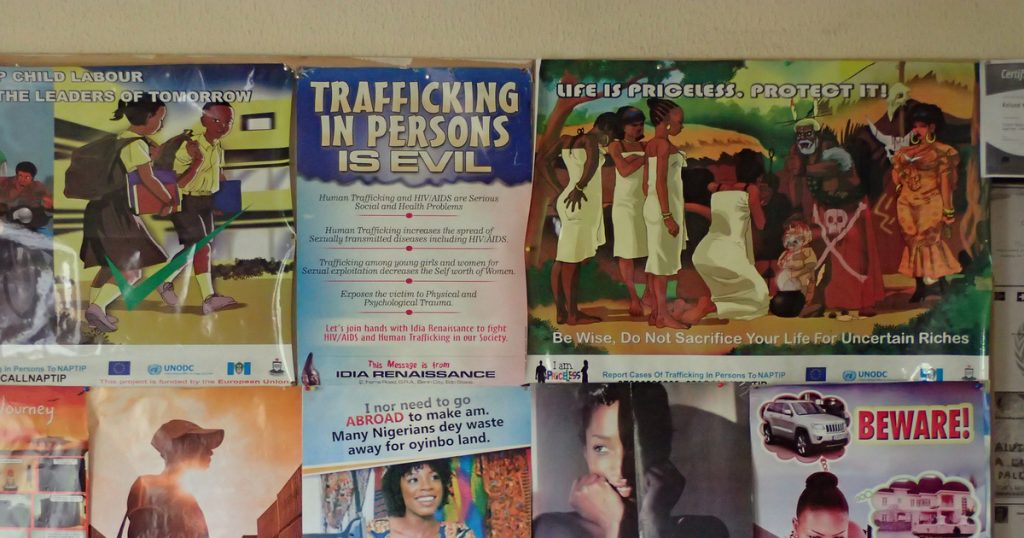Traditionally, when one imagines how someone ends up in slavery of any kind, one sees images of people being forcibly taken from their homes and sent to a foreign country, with absolutely no say in the matter. While this is usually the case in sexual slavery and for other kinds of bondage, it is no longer the case for women from Edo State in Nigeria, that provides 80% of women trafficked into Europe.1 Instead, there is a new phenomenon where women seek out passage to Europe through Madams, knowingly entering into prostitution. This was not always been the case, but extreme poverty, where some even lack running water, this practice has begun flourishing.2

Previously, recruiters lure women with tales of jobs in Europe, working for wealthy families, being hairdressers or nannies, only to find out the harsh reality of forced sex work once they arrived. Eventually, returning with embellished stories of wealth to tempt and recruit women themselves, completing the vicious cycle from victim to perpetrator. Some of the Madams even live in lavish houses, behind gates, as a testament of just what can be earned in European sex work. This show of wealth, in a desperate state, slowly began to transform just how women were recruited into the sex trafficking world.3
More recently, traffickers are being sought out by their victims in hope for a better life for themselves and their families.4 Little do they know of the harsh conditions and abuse they will endure before they can ever return home. After discussion of the “terms” of the work, the women sign legally binding contracts that say they will pay back rent, travel expenses, food, and other miscellaneous expenses, sometimes in a matter of months, sometimes in many years. These expenses total anywhere from 30,000 to 60,000 US dollars, on average. Usually, the women charge 5 to 10 US dollars per client, requiring them to work from sunup to sundown, and sometimes longer.5

Aside from relying on the signed contracts, Madams and pimps use the threat of violence against families, and religion, to keep the women from leaving.6 Using black magic referred to as JuJu, priests perform complex rituals that include eating raw chicken hearts, harm to oneself, drinking cocktails of their own fingernails, hair, and blood, as well as other methods, to bind the women with their traffickers. After completion of the rituals, they are made to feel that death, insanity, or harm will come to their families if they are to break their oath of repayment. A priest, who has benefited greatly from Madams and the pimps he has helped, stated in an interview that the purpose of these rituals are that “she never sleeps well or has peace of mind until she pays what she owes.”7

Furthermore, religion and belief in the negative effects that stem from the severance of the oaths have even led parents to become more complacent and insist that their daughters follow the requests of the people who are exploiting them.8 This, coupled with extreme poverty, exacerbate the growing phenomenon in Edo State, rendering it even more difficult to combat. Though, there are efforts to better the lives of women in Edo State. Education promotes agricultural development and other “basic needs industries,” and is central to the campaigns to inform about the horrors and negative effects of trafficking, and working toward the decriminalization, not legalization, of prostitution to help, instead of punish, those who have been ensnared in a vicious cycle of abuse which is making strides.9
New policies and rules are being implemented and promoted by grassroots organizations, and governments are taking notice. On November 15, 2000, the UN established a “Protocol to Prevent, Suppress and Punish Trafficking in Persons, Especially Women and Children, supplementing the United Nations Convention against Transnational Organized Crime,” which has 173 signatories, showing the world that these malum in se actions have become malum prohibitum or universally illegal, and punishable internaitonally.10 Even with all of these measures, and the recognition of this epidemic at an international level, there are still roughly 4.8 million people (19% of all humans trafficked) enslaved for sexual exploitation in the world, bringing in 99 billion dollars annually (66% of all profits from human trafficking).11 More must be done to end all forms of human trafficking, and it starts with a deeper understanding of the differing local and cultural patterns of recruitment throughout the world. Education and the provision of alternative work options remain the most powerful deterrents.
- Seema Kawar, From Benin City to the Shores of Italy: A New Hub of Human Trafficking, NAOC, (Accessed January 31, 2018), http://natoassociation.ca/from-benin-city-to-the-shores-of-italy-a-new-hub-of-human-trafficking/. ↵
- Abaobi Tricia Nwaubani, Cycle of exploitation turns Nigerian sex slaves in Italy into traffickers, News.trust.org, (Accessed February 12, 2018), http://news.trust.org/item/20161108000327-qfsaw/. ↵
- Abaobi Tricia Nwaubani, Cycle of exploitation turns Nigerian sex slaves in Italy into traffickers, News.trust.org, (Accessed February 12, 2018), http://news.trust.org/item/20161108000327-qfsaw/. ↵
- Abaobi Tricia Nwaubani, Cycle of exploitation turns Nigerian sex slaves in Italy into traffickers, News.trust.org, (Accessed February 12, 2018), http://news.trust.org/item/20161108000327-qfsaw/. ↵
- Esohe Aghatise, Iroko Onlus: Working to Combat the Trafficking of Nigerian Women and Girls Into Italy, Canadian Woman Studies 22, no. 3/4 (2003): 197-199, Humanities Full Text (H.W. Wilson), EBSCOhost (accessed January 31, 2018). ↵
- Esohe Aghatise, Iroko Onlus: Working to Combat the Trafficking of Nigerian Women and Girls Into Italy, Canadian Woman Studies 22, no. 3/4 (2003): 197-199, Humanities Full Text (H.W. Wilson), EBSCOhost (accessed January 31, 2018). ↵
- C. S. Baarda, Human trafficking for sexual exploitation from Nigeria into Western Europe: The role of voodoo rituals in the functioning of a criminal network, European Journal Of Criminology 13, no. 2 (2016): 257, Complementary Index, EBSCOhost (accessed January 31, 2018). ↵
- Abaobi Tricia Nwaubani, Cycle of exploitation turns Nigerian sex slaves in Italy into traffickers, News.trust.org, (Accessed February 12, 2018), http://news.trust.org/item/20161108000327-qfsaw/. ↵
- Esohe Aghatise, Iroko Onlus: Working to Combat the Trafficking of Nigerian Women and Girls Into Italy, Canadian Woman Studies 22, no. 3/4 (2003): 197-199, Humanities Full Text (H.W. Wilson), EBSCOhost (accessed January 31, 2018). ↵
- United Nations, Protocol to Prevent, Suppress and Punish Trafficking in Persons, Especially Women and Children, supplementing the United Nations Convention against Transnational Organized Crime, International Law & World Order: Westons & Carlsons Basic Documents, November 15, 2000, doi:10.1163/2211-4394_rwilwo_sim_033351. ↵
- Human Trafficking by the Numbers, Human Rights First, January 7, 2017. (Accessed February 12, 2018), https://www.humanrightsfirst.org/resource/human-trafficking-numbers. ↵



90 comments
Noah Laing
I felt this article was very informative due to the fact that this is a topic that needs to be taken seriously and raising awareness for it is important. Regarding the article itself, it’s awful to read these stories of human trafficking, especially in this article as woman are threatened and forced to have involvement in giving away their bodies, which is seen a lot in areas that are poverty struck. The author of this article claimed that there are 4.8 million people enslaved in human trafficking to this day which is absolutely awful, this is certainly an issue in todays world that needs to be solved.
Arianna Kennet
Yet another story of women being forced into prostitution, except the difference with this one is that it ends up being a choice. Its a pity to see the extends women had to go to just to earn a living, and how it still happens in todays world. How cruel of those people to lure these poor women into thinking that they would be getting better lives by lying about what sort of work they would have to do, only for them to find out they there were not getting the jobs said, and they were not going to have better lives as promised.
Kayla Lopez
Human sex trafficking is an ever-present problem is societies all over the world, this is extremely sad but it is true. It is disgusting how pimps and madams actually threaten the girl’s family in order to get them involved. Though this is not a pleasant topic, I felt that is was clearly written and it contained a great amount of information that I would not have known otherwise.
Gloria Baca
Sex trafficking has always been a delicate subject and this article does a great way in handling it. Nigeria’s government has always have its ups and downs and sex trafficking is one of them. Women in search for jobs are fed lies and are lured into sex trafficking even though they seem to think they’re in for a job. Women are forced to commit to this due to fear and that’s what’s saddens me the most. I think this article was a great way to inform the public of the vast issue it is in Nigeria. It was very informative and greatly written.
Robert Flores
This story was extremely sad. To hear that millions of africans are either tricked or desperate enough to go into this line of work is heartbreaking. I hope one day most people in africa are able to get a good education that way people with bad intentions would be less likely to take advantage of them, if there is one thing that education provides its options.
Erin Vento
I think that articles like this are really important because people never want to talk about human trafficking and its such a huge deal all over the world and can happen to anyone. This article was so well written and really brought to light, how exploitative traffickers are, and how even despite progress being made towards fixing the problem, the problem still is not fixed.
Miguel Camarillo-Cohen
This was a very well written and eye opening article. Human sex trafficking is a form of slavery that is an ongoing problem throughout the world. It’s terrible that madams or pimps prey on women promising a better life; only to find out that those promises are far from the truth. It is equally appalling that these madams/pimps manipulate these young women by falsely threatening there families.
Suvesh Vasal
this article was extremely informative about the actual side of sex trafficking. It was well written and very interesting to read. It is awful that they do all those rituals to ensure that they do not leave until they have paid back what is owed. This is a serious issue that needs to be resolved soon. I hate hearing about issues such as this one and it needs to become more publically known so action can be taken.
Johnanthony Hernandez
Interesting article, it seems that we forget about the victims of sex trafficking and at that forget that it’s still prevalent. I didn’t it had become so prevalent in Nigeria, and it created a profitable business for the Madams that run it. It seems that like most other places that the women are lured into it with false promises of jobs as hairdressers or nannies to wealthy family. For me I usually don’t think of Nigeria being an area that would be a major point in sex trafficking, but with the superstitious nature of the area it makes some sense that many wouldn’t refuse out of fear of what will come of their families.
Yahaira Martinez
Such a very well written and informative article regarding this topic. This has been such a widespread topic that is gaining more and more attention for the horrific acts that the women placed in are experiencing. However in the cases that i have heard of, the women are not placed in there by choice and are forced, exactly how the woman in these articles are forced by threatening to hurt their families until a debt is settled. nonetheless this is an issue that is very well heard of but not very well known of and this article allows us to be well informed on the subject.